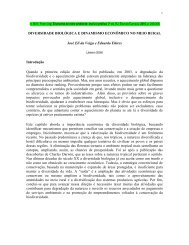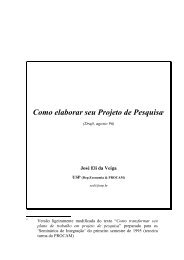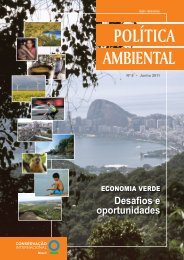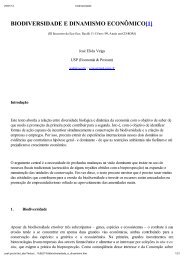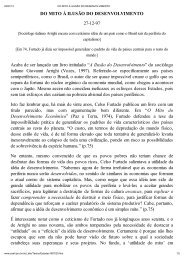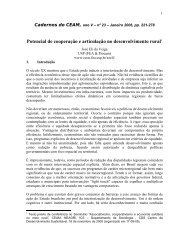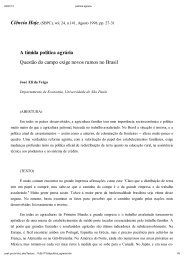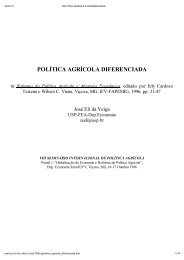sustainable development 20 years on from the ... - José Eli da Veiga
sustainable development 20 years on from the ... - José Eli da Veiga
sustainable development 20 years on from the ... - José Eli da Veiga
Create successful ePaper yourself
Turn your PDF publications into a flip-book with our unique Google optimized e-Paper software.
174<br />
9. Farmers<br />
Rural households, indigenous peoples and <strong>the</strong>ir communities, and farmers, a large proporti<strong>on</strong> of whom are<br />
women, are <strong>the</strong> stewards of many of <strong>the</strong> planet’s resources. For this reas<strong>on</strong>, Agen<strong>da</strong> 21, chapter 32, states<br />
that a farmer-centred approach is <strong>the</strong> key to <strong>the</strong> attainment of agricultural sustainability in both developed<br />
and developing countries, and many of <strong>the</strong> programme areas in Agen<strong>da</strong> 21 address this objective.<br />
In <str<strong>on</strong>g>20</str<strong>on</strong>g>10, rural inhabitants accounted for approximately 19% of <strong>the</strong> total populati<strong>on</strong> in <strong>the</strong> regi<strong>on</strong>.<br />
Of this group, between 11% and 33% work in agriculture (ECLAC/FAO/IICA, <str<strong>on</strong>g>20</str<strong>on</strong>g>11). They are <strong>the</strong><br />
people most directly affected by poor management of water resources and land. A lack of financial<br />
resources, coupled with remoteness <strong>from</strong> urban centres, where legal instituti<strong>on</strong>s, training centres and<br />
instituti<strong>on</strong>s offering technical and financial support are based, often mean that programmes are not<br />
effective. The challenges facing farmers in <strong>the</strong> regi<strong>on</strong> include proper access to educati<strong>on</strong>, technical<br />
training and financial support; access to new producti<strong>on</strong> technologies that are compatible with human and<br />
material <str<strong>on</strong>g>development</str<strong>on</strong>g>; <str<strong>on</strong>g>sustainable</str<strong>on</strong>g> use of natural resources, aquifers and <strong>the</strong> envir<strong>on</strong>ment; and <strong>the</strong> need to<br />
take a <str<strong>on</strong>g>sustainable</str<strong>on</strong>g> approach to boosting productivity. Retaining and incorporating young people into<br />
farming was also identified as a major challenge for <strong>the</strong> regi<strong>on</strong>.<br />
A remaining challenge for <strong>the</strong> regi<strong>on</strong> is to ensure that public agricultural policies take family<br />
farming into c<strong>on</strong>siderati<strong>on</strong>. Family farming accounts for a large share of agricultural output in every country<br />
in <strong>the</strong> regi<strong>on</strong>. In Nicaragua, it makes up 67% of <strong>the</strong> value of agricultural output; in Ecuador, 45%; in<br />
Colombia, 41%; in Mexico, 39%; in Brazil, 38%; and in Chile, 27% (IDB/FAO, <str<strong>on</strong>g>20</str<strong>on</strong>g>07). In some countries,<br />
family farms account for a large share of all farms. In Nicaragua, family farmers run 98% of all farms; in<br />
Ecuador, 88%; in Chile and Colombia, 87%; in Brazil, 85%; and in Mexico, 78% (see figure III.2).<br />
Figure III.2<br />
LATIN AMERICA (SELECTED COUNTRIES): FAMILY FARMING AS A SHARE OF THE VALUE<br />
OF AGRICULTURAL PRODUCTION AND AS A SHARE OF ALL FARMS<br />
(Percentages)<br />
1<str<strong>on</strong>g>20</str<strong>on</strong>g><br />
100<br />
80<br />
60<br />
40<br />
<str<strong>on</strong>g>20</str<strong>on</strong>g><br />
0<br />
Brazil Chile Colombia Ecuador Mexico Nicaragua<br />
Share of all farms in <strong>the</strong> sector<br />
Share of all farms<br />
Source: Inter-American Development Bank (IDB)/Food and Agriculture Organizati<strong>on</strong> of <strong>the</strong> United Nati<strong>on</strong>s (FAO), Políticas<br />
para la agricultura familiar en América Latina y el Caribe, Santiago, Chile, <str<strong>on</strong>g>20</str<strong>on</strong>g>07.



